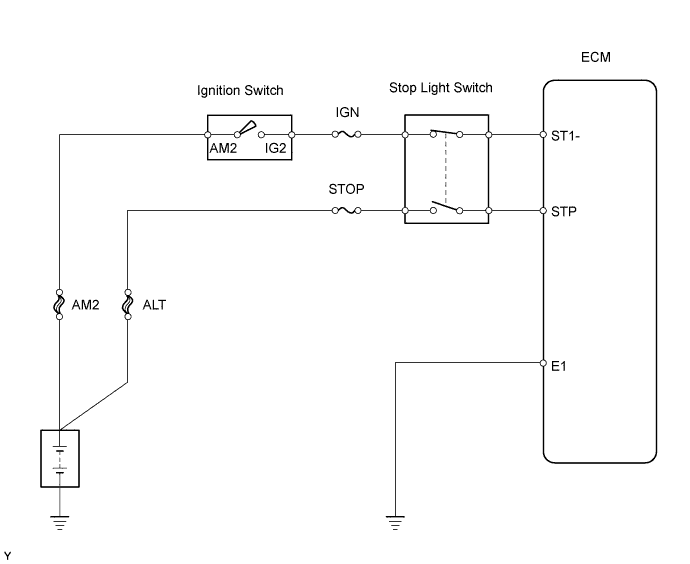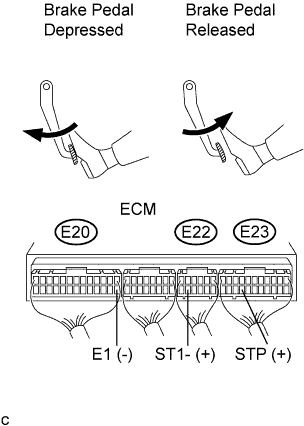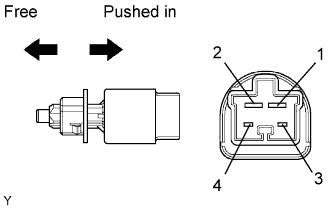Dtc 51 Stop Light Switch Circuit Malfunction
DESCRIPTION
WIRING DIAGRAM
INSPECTION PROCEDURE
When using intelligent tester:
READ VALUE USING INTELLIGENT TESTER (STOP LIGHT SWITCH)
CHECK ECM (STP, ST1- VOLTAGE)
INSPECT STOP LIGHT SWITCH
CHECK HARNESS AND CONNECTOR (ECM - STOP LIGHT SWITCH)
When not using intelligent tester:
CHECK STOP LIGHT (OPERATION)
CHECK ECM (STP, ST1- VOLTAGE)
INSPECT STOP LIGHT SWITCH
CHECK HARNESS AND CONNECTOR (ECM - STOP LIGHT SWITCH)
DTC 51 Stop Light Switch Circuit Malfunction |
DESCRIPTION
In this system, the signal of the stop light switch is used to judge whether the stop light system is abnormal or not.The stop light switch has a duplex system (signals STP and ST1-) to memorize the abnormality when the signals of depressing and releasing the brake pedal are detected simultaneously.- HINT:
- The normal condition is shown in the table below.
Signal
| Brake pedal released
| In transition
| Brake pedal depressed
|
STP
| OFF
| ON
| ON
|
ST1-
| ON
| ON
| OFF
|
DTC No.
| DTC Detection Condition
| Trouble Area
|
51
| When STP (without depressing the brake pedal) and ST1- (with the brake pedal depressed) signals continue for longer than 0.5 seconds with the ignition switch ON
| - Open or short in stop light switch signal circuit
- Stop light switch
- ECM
|
WIRING DIAGRAM
INSPECTION PROCEDURE
- HINT:
- Read freeze frame data using the intelligent tester. The ECM records vehicle and driving condition information as freeze frame data the moment a DTC is stored. When troubleshooting, freeze frame data can be helpful in determining whether the vehicle was running or stopped, whether the engine was warmed up or not, whether the air-fuel ratio was lean or rich, as well as other data recorded at the time of a malfunction.
When using intelligent tester:
| 1.READ VALUE USING INTELLIGENT TESTER (STOP LIGHT SWITCH) |
Connect the intelligent tester to the DLC3.
Turn the ignition switch ON.
Enter the following menus: Powertrain / Engine and ECT / Data List / Stop Light SW.
- OK:
Brake Pedal
| Display
|
Depressed
| Stop Light SW ON
|
Repressed
| Stop Light SW OFF
|
| | CHECK FOR INTERMITTENT PROBLEMS |
|
|
| 2.CHECK ECM (STP, ST1- VOLTAGE) |
Turn the ignition switch ON.
Measure the voltage of the ECM connector.
- Standard voltage:
Brake pedal is depressedTester Connection
| Specified Condition
|
E23-19 (STP) - E20-14 (E1)
| 9 to 14 V
|
E22-11 (ST1-) - E20-14 (E1)
| Below 1.5 V
|
Brake pedal is releasedTester Connection
| Specified Condition
|
E23-19 (STP) - E20-14 (E1)
| Below 1.5 V
|
E22-11 (ST1-) - E20-14 (E1)
| 9 to 14 V
|
| 3.INSPECT STOP LIGHT SWITCH |
Disconnect the stop light switch connector.
Measure the resistance of the sensor.
- Standard resistance:
Tester Connection
| Switch Position
| Specified Condition
|
3 - 4
| Switch pin free
| Below 1 Ω
|
3 - 4
| Switch pin pushed in
| 10 kΩ or higher
|
1 - 2
| Switch pin free
| 10 kΩ or higher
|
1 - 2
| Switch pin pushed in
| Below 1 Ω
|
| | REPLACE STOP LIGHT SWITCH |
|
|
| 4.CHECK HARNESS AND CONNECTOR (ECM - STOP LIGHT SWITCH) |
Disconnect the S14 stop light switch connector.
Disconnect the E22 and E23 ECM connectors.
Measure the resistance of the wire harness side connectors.
- Standard resistance :
Tester Connection
| Specified Condition
|
S14-1 - E23-19 (STP)
| Below 1 Ω
|
S14-4 - E22-11 (ST1-)
| Below 1 Ω
|
S14-1 or E23-19 (STP) - Body ground
| 10 kΩ or higher
|
S14-4 or E22-11 (ST1-) - Body ground
| 10 kΩ or higher
|
| | REPAIR OR REPLACE HARNESS OR CONNECTOR |
|
|
| OK |
|
|
|
| REPAIR OR REPLACE POWER SOURCE CIRCUIT |
|
When not using intelligent tester:
| 1.CHECK STOP LIGHT (OPERATION) |
Check if the stop lights go on and off normally when the brake pedal is depressed and released.
- OK:
- The stop lights go on and off normally.
| | REPAIR STOP LIGHT SWITCH CIRCUIT |
|
|
| 2.CHECK ECM (STP, ST1- VOLTAGE) |
Turn the ignition switch ON.
Measure the voltage of the ECM connector.
- Standard voltage:
Brake pedal is depressedTester Connection
| Specified Condition
|
E23-19 (STP) - E20-14 (E1)
| 9 to 14 V
|
E22-11 (ST1-) - E20-14 (E1)
| Below 1.5 V
|
Brake pedal is releasedTester Connection
| Specified Condition
|
E23-19 (STP) - E20-14 (E1)
| Below 1.5 V
|
E22-11 (ST1-) - E20-14 (E1)
| 9 to 14 V
|
| 3.INSPECT STOP LIGHT SWITCH |
Disconnect the stop light switch connector.
Measure the resistance of the sensor.
- Standard resistance:
Tester Connection
| Switch Position
| Specified Condition
|
3 - 4
| Switch pin free
| Below 1 Ω
|
3 - 4
| Switch pin pushed in
| 10 kΩ or higher
|
1 - 2
| Switch pin free
| 10 kΩ or higher
|
1 - 2
| Switch pin pushed in
| Below 1 Ω
|
| | REPLACE STOP LIGHT SWITCH |
|
|
| 4.CHECK HARNESS AND CONNECTOR (ECM - STOP LIGHT SWITCH) |
Disconnect the S14 stop light switch connector.
Disconnect the E22 and E23 ECM connectors.
Measure the resistance of the wire harness side connectors.
- Standard resistance:
Tester Connection
| Specified Condition
|
S14-1 - E23-19 (STP)
| Below 1 Ω
|
S14-4 - E22-11 (ST1-)
| Below 1 Ω
|
S14-1 or E23-19 (STP) - Body ground
| 10 kΩ or higher
|
S14-4 or E22-11 (ST1-) - Body ground
| 10 kΩ or higher
|
| | REPAIR OR REPLACE HARNESS OR CONNECTOR |
|
|
| OK |
|
|
|
| REPAIR OR REPLACE POWER SOURCE CIRCUIT |
|






